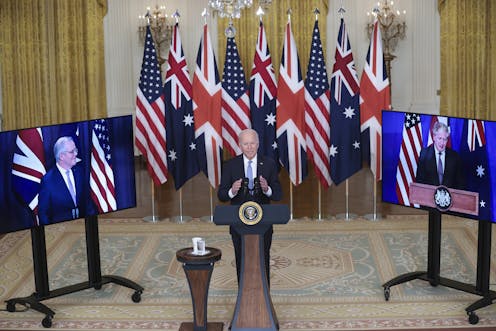Australia to build nuclear submarines in a new partnership with the US and UK
- Written by Michelle Grattan, Professorial Fellow, University of Canberra

Australia will build a fleet of nuclear submarines as part of a new security partnership with the United States and United Kingdom, dubbed AUKUS.
The dramatic move is a response to the growing threat of China and will be seen as provocative by that country.
In an early morning address at Parliament House, part of a three-way virtual appearance with US President Joe Biden and UK Prime Minister Boris Johnson, Prime Minister Scott Morrison said Australia, the US and the UK had “always seen the world through a similar lens”.
“Our world is becoming more complex, especially here in our region, the Indo-Pacific.
"This affects us all. The future of the Indo-Pacific will impact all our futures. To meet these challenges, to help deliver the security and stability our region needs, we must now take our partnership to a new level.”
The submarines will be built in Adelaide, in co-operation with the UK and US.
Morrison stressed “Australia is not seeking to acquire nuclear weapons or establish a civil nuclear capability”.
There will be an 18-month long effort by the three countries to develop the best plan to deliver the new capability. In doing this, expertise from the US and the UK will be used.
Opposition leader Anthony Albanese indicated Labor’s general support for the submarines and sought a bipartisan mechanism for oversight of the process.
In a statement Morrison, Biden and Johnson said: “Through AUKUS, our governments will strengthen the ability of each to support our security and defence interests, building on our longstanding and ongoing bilateral ties.
"We will promote deeper information and technology sharing. We will foster deeper integration of security and defence-related science, technology, industrial bases, and supply chains. And in particular, we will significantly deepen co-operation on a range of security and defence capabilities.”
The leaders said: “The endeavour we launch today will help sustain peace and stability in the Indo-Pacific region.”
American nuclear-powered submarines visit Australia.
Currently, Australia has a $90 billion contract with the French for conventionally-powered submarines. This has been controversial because of the long lead time and escalating costs. Cancellation costs will run into billions of dollars.
The French government has reacted angrily. It declared the Australian decision to halt the current “Future Submarine Program” was “contrary to the letter and spirit of the co-operation that prevailed between France and Australia, based on a relationship of political trust as well as on the development of a very high-level defence industrial and technological base in Australia”.
In a statement Jean-Yves Le Drian, minister for Europe and foreign affairs, and Florence Parly, minister of the armed forces, said: “The American choice to exclude a European ally and partner such as France from a structuring partnership with Australia, at a time when we are facing unprecedented challenges in the Indo-Pacific region, whether in terms of our values or in terms of respect for multilateralism based on the rule of law, shows a lack of coherence that France can only note and regret.”
A former French ambassador to the US, Gérard Araud, tweeted: “The world is a jungle. France has just been reminded of this bitter truth by the way the US and the UK have stabbed her in the back in Australia”.
Former Prime Minister Paul Keating criticised the announcement as representing a further loss of Australian sovereignty.
The agreement for Australia “to move to a fleet of US supplied nuclear submarines will amount to a lock-in of Australian military equipment and thereby forces, with those of the United States with only one underlying objective: the ability to act collectively in any military engagement by the United States against China” Keating said.
“This arrangement would witness a further dramatic loss of Australian sovereignty, as material dependency on the United States robbed Australia of any freedom or choice in any engagement Australia may deem appropriate,” he said.
New Zealand Prime Minister Jacinda Ardern said under that under that country’s legislation, the nuclear submarines would not be able to visit there.
Senate crossbencher Rex Patrick, a former submariner, said the decision on nuclear submarines should come under rigorous parliamentary scrutiny.
“I’ve been a strong critic of the French submarine deal. The delays and cost overruns are huge and unacceptable. But we have to be careful we don’t move from one massive procurement disaster into something else that hasn’t been thought through properly.”
Patrick said that “acquiring, operating and maintaining a nuclear submarine fleet without a domestic nuclear power industry is a challenge that must not be underestimated”.
Greens leader Adam Bandt attacked the decision, saying it was “a dangerous move that makes our country less safe by putting floating Chernobyls in the heart of our major cities, increasing the risk of conflict in our region and putting Australia in the firing line”.
He said the government was trying to distract from its failures by preparing for a khaki election.
Authors: Michelle Grattan, Professorial Fellow, University of Canberra





